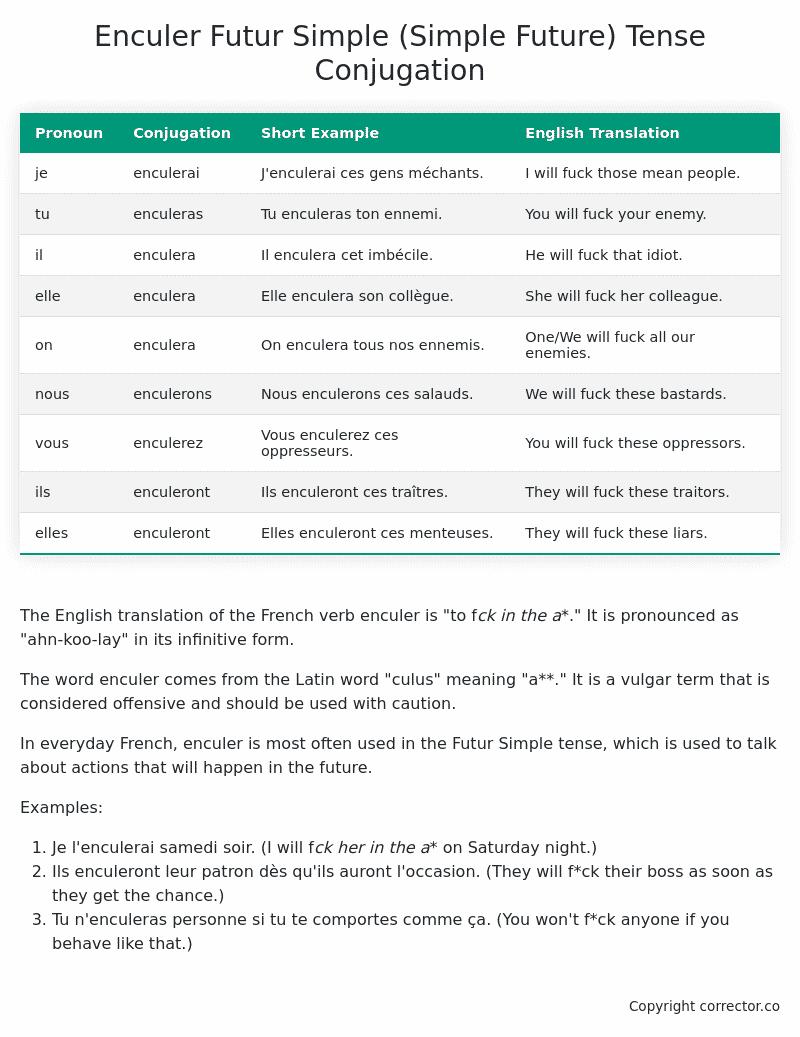Futur Simple (Simple Future) Tense Conjugation of the French Verb enculer
Introduction to the verb enculer
The English translation of the French verb enculer is “to fck in the a*.” It is pronounced as “ahn-koo-lay” in its infinitive form.
The word enculer comes from the Latin word “culus” meaning “a**.” It is a vulgar term that is considered offensive and should be used with caution.
In everyday French, enculer is most often used in the Futur Simple tense, which is used to talk about actions that will happen in the future.
Examples:
- Je l’enculerai samedi soir. (I will fck her in the a* on Saturday night.)
- Ils enculeront leur patron dès qu’ils auront l’occasion. (They will f*ck their boss as soon as they get the chance.)
- Tu n’enculeras personne si tu te comportes comme ça. (You won’t f*ck anyone if you behave like that.)
Table of the Futur Simple (Simple Future) Tense Conjugation of enculer
| Pronoun | Conjugation | Short Example | English Translation |
|---|---|---|---|
| je | enculerai | J’enculerai ces gens méchants. | I will fuck those mean people. |
| tu | enculeras | Tu enculeras ton ennemi. | You will fuck your enemy. |
| il | enculera | Il enculera cet imbécile. | He will fuck that idiot. |
| elle | enculera | Elle enculera son collègue. | She will fuck her colleague. |
| on | enculera | On enculera tous nos ennemis. | One/We will fuck all our enemies. |
| nous | enculerons | Nous enculerons ces salauds. | We will fuck these bastards. |
| vous | enculerez | Vous enculerez ces oppresseurs. | You will fuck these oppressors. |
| ils | enculeront | Ils enculeront ces traîtres. | They will fuck these traitors. |
| elles | enculeront | Elles enculeront ces menteuses. | They will fuck these liars. |
Other Conjugations for Enculer.
Le Present (Present Tense) Conjugation of the French Verb enculer
Imparfait (Imperfect) Tense Conjugation of the French Verb enculer
Passé Simple (Simple Past) Tense Conjugation of the French Verb enculer
Passé Composé (Present Perfect) Tense Conjugation of the French Verb enculer
Futur Simple (Simple Future) Tense Conjugation of the French Verb enculer (this article)
Futur Proche (Near Future) Tense Conjugation of the French Verb enculer
Plus-que-parfait (Pluperfect) Tense Conjugation of the French Verb enculer
Passé Antérieur (Past Anterior) Tense Conjugation of the French Verb enculer
Futur Antérieur (Future Anterior) Tense Conjugation of the French Verb enculer
Subjonctif Présent (Subjunctive Present) Tense Conjugation of the French Verb enculer
Subjonctif Passé (Subjunctive Past) Tense Conjugation of the French Verb enculer
Subjonctif Imparfait (Subjunctive Imperfect) Tense Conjugation of the French Verb enculer
Subjonctif Plus-que-parfait (Subjunctive Pluperfect) Tense Conjugation of the French Verb enculer
Conditionnel Présent (Conditional Present) Tense Conjugation of the French Verb enculer
Conditionnel Passé (Conditional Past) Tense Conjugation of the French Verb enculer
L’impératif Présent (Imperative Present) Tense Conjugation of the French Verb enculer
L’infinitif Présent (Infinitive Present) Tense Conjugation of the French Verb enculer
Struggling with French verbs or the language in general? Why not use our free French Grammar Checker – no registration required!
Get a FREE Download Study Sheet of this Conjugation 🔥
Simply right click the image below, click “save image” and get your free reference for the enculer Futur Simple tense conjugation!

Enculer – About the French Futur Simple (Simple Future) Tense
Formation of Futur Simple
For regular -er verbs (e.g., parler – to speak)
For regular -ir verbs (e.g., finir – to finish)
For regular -re verbs (e.g., vendre – to sell)
Common Everyday Usage Patterns
Conditional Statements
Interactions with Other Tenses
Futur Antérieur
Conditional
Present
Summary
I hope you enjoyed this article on the verb enculer. Still in a learning mood? Check out another TOTALLY random French verb conjugation!


